After Wisdom Tooth Removal
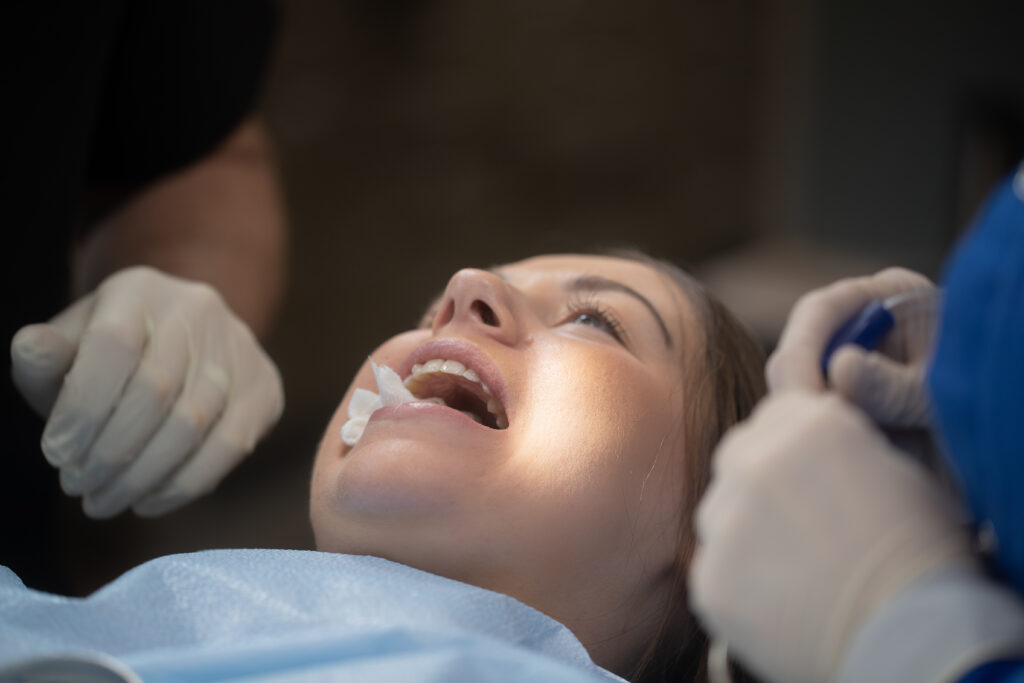
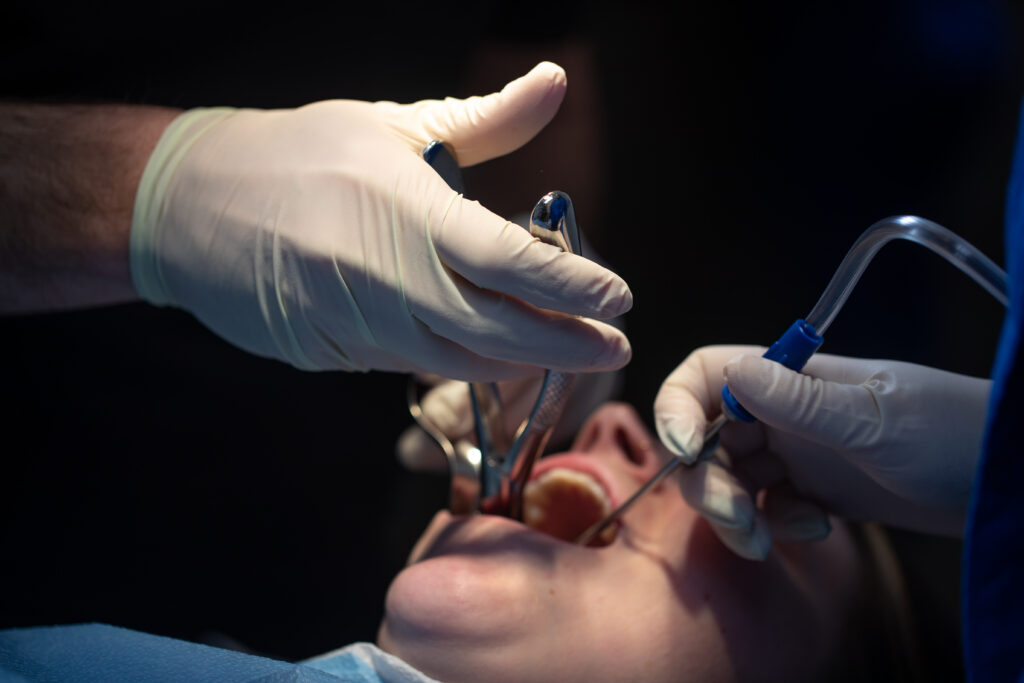
Post-operative care is very important. Unnecessary pain and the complications of infection and swelling can be minimized if the instructions are followed carefully.
AFTER HOURS YOU MAY TEXT OR CALL THE DOCTOR AT (301) 785-0510
If doctor does not answer a page after 45 minutes please call again!
If you can’t reach us after hours and are concerned please do not hesitate to go to the ER-we recommend Suburban Hospital or Washington Hospital Center where oral surgery service is available.
Please read these instructions carefully. Sometimes the after-effects of oral surgery are quite minimal, so not all of these instructions may apply. Common sense will often dictate what you should do. Follow these guidelines or call our office anytime for clarification.
Gauze in Mouth
Bite down firmly on the gauze packs that have been placed over the surgical areas, making sure they remain in place. Do not change them for the first 30 minutes unless the bleeding is not being controlled. If active bleeding persists after one hour, place enough new gauze to obtain pressure over the surgical site for another 30-45 minutes. When bleeding slows down, remove them and begin to have something cold to drink.
Exercise Care
Do not disturb the surgical area today. Do not spit! This will increase bleeding. Gently swallow. Do not rinse your mouth or use a straw for 12-24 hours, as this will disturb the blood clot that is necessary for normal healing. You may brush your teeth gently after 12 hours. It is OK to use toothpaste. Do not smoke for at least 48 hours since it is very detrimental to healing and may also contribute to the development of a dry socket.
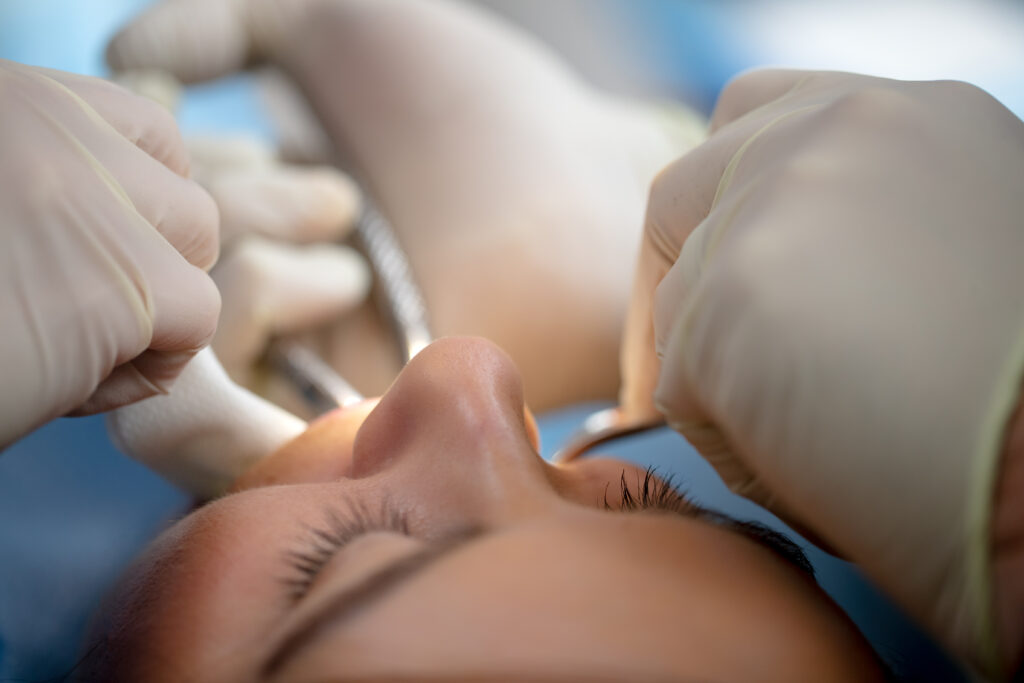

OOZING
Intermittent bleeding or oozing is normal in the first 24 hours. If heavy, It may be controlled by placing fresh gauze over the surgical areas and biting down firmly for 30-45 minutes. Also elevate your head using several pillows. Never sleep or eat with gauze in your mouth.
Steady Bleeding
Bleeding should never be severe. If it is, it usually means that the packs are being clenched between your teeth rather than exerting pressure on the surgical areas. Try repositioning fresh packs. If bleeding persists or becomes heavy you may substitute a tea bag (soaked in hot water, squeezed damp-dry and wrapped in moist gauze) for 30 minutes. If bleeding remains uncontrolled, please call our office.
Swelling and Fever
Often there is some swelling associated with oral surgery. You can minimize this by using a cold pack or ice bag wrapped in a towel and applied firmly to face or cheek adjacent to the surgical area. This should be applied 20 minutes on and 20 minutes off during the first 12 to 24 hours. Bags of frozen vegetables are very effective to use as ice bags. A sore throat may develop. The muscles of the throat are near the extraction sites. Swelling into the throat muscles can cause pain. This is normal and should subside in 3-4 days. The corners of the mouth and lips are stretched during surgery. They may dry out and crack. They should be kept moist with an ointment like Vaseline. There may be a slight elevation of temperature for 24-48 hours. If temperature continues beyond this period, notify our office. The swelling should peak (get worse) 3 to 4 days after surgery. This is normal and expected. Pain may also become worse several days after surgery.
Nausea
Nausea is not uncommon event after surgery, and it is sometimes caused by stronger pain medicines. It may be reduced by preceding each pill with soft food, then taking the pill with a large volume of water. Cola drinks or ginger-ale may help. Try to continue taking clear fluids and minimize the pain medication, but call us if you do not feel better or if repeated vomiting occurs. Do not drink alcohol until you have stopped taking narcotic pain medication.
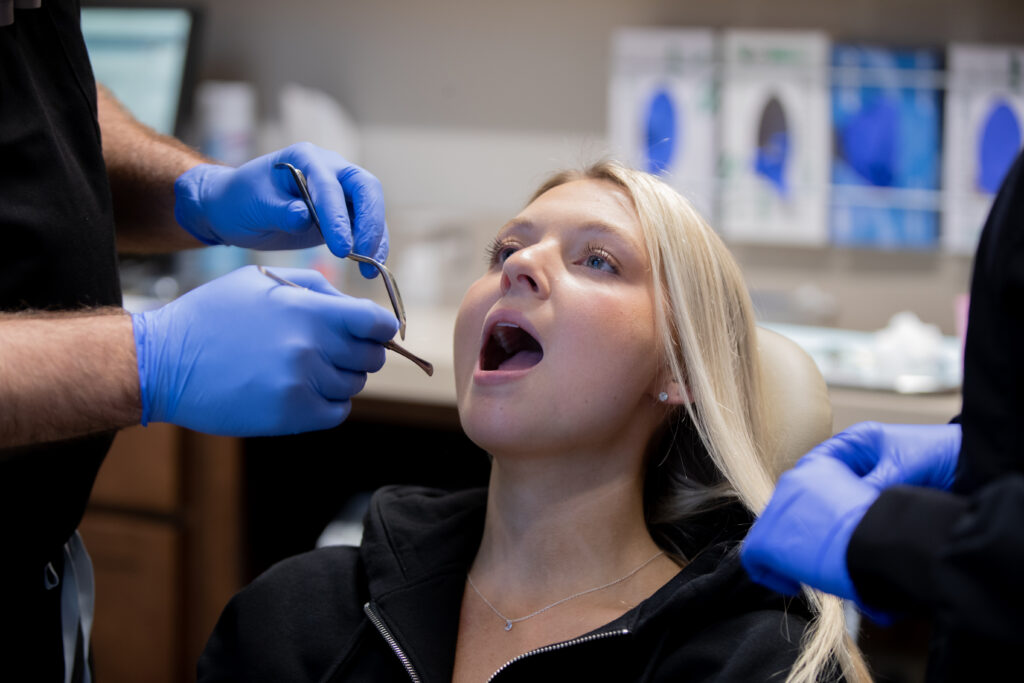
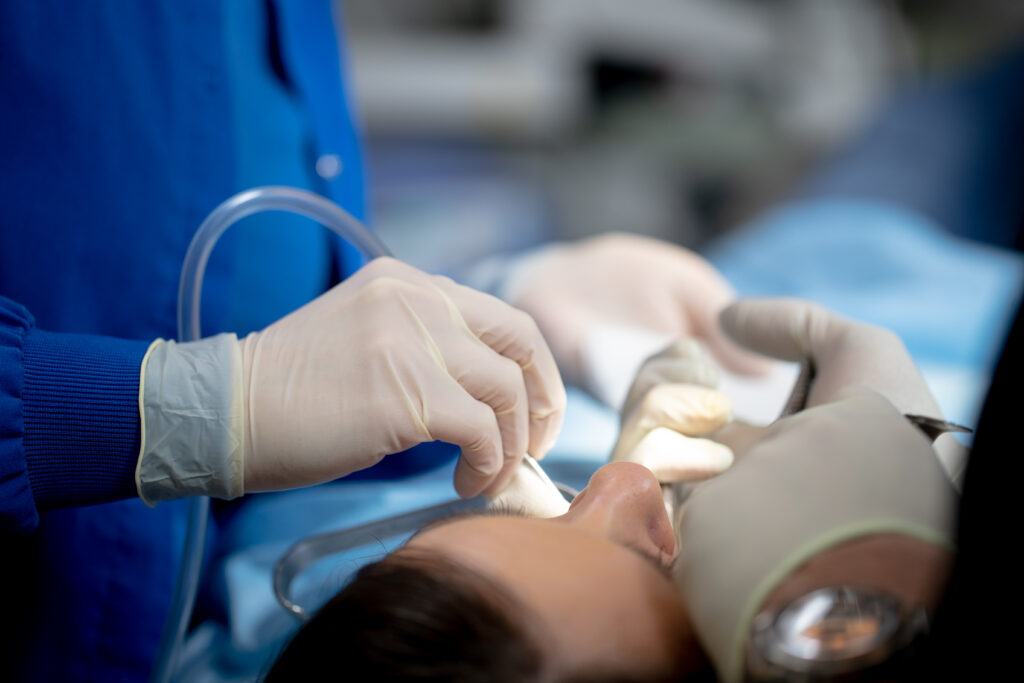
Diet
Avoid hot foods and hot liquids for 12 hours and don’t attempt to chew until the feeling returns to the tongue and lips. Avoid foods like nuts, popcorn, pretzels, etc., that may get lodged in the socket areas. Over the next several days you can progress to solid foods at your own pace. It is important not to skip meals! Protein is important for the healing process. We recommend using a protein drink or supplement for several days. Eggs and Greek yogurt are good sources as well. Eat nourishing food that can be taken with comfort (i.e., Ensure, yogurt, applesauce, ice cream, etc.). If you eat regularly and drink plenty of fluids, you will feel better, gain strength, have less discomfort and heal faster.
After IV Sedation
You must return directly home and rest. For the first several hours try to limit ambulation (walking around) to minimize the potential for falling. For 24 hours do not operate an automobile or other machine which requires alertness. During the first 24-48 hours limit physical activity. Over exertion may lead to postoperative bleeding and discomfort. Do not drink alcohol for 24 hours and NEVER mix alcohol with narcotic pain medication. The day after surgery you should mobilize throughout the day, no permanent bed rest.
Mouth Rinses
Keeping your mouth clean after surgery is essential. Use one teaspoon of salt dissolved in a glass of warm water and rinse your mouth out at least three times a day for the next 5 to 7 days. Do not begin rinsing, however, for the first 12 hours. We do not want you to use a syringe or device to irrigate the sites for now. We may give you one at the follow up visit.
Stitches
Do not worry about stitches. Most sutures we use dissolve and do not have to be removed. Do not be concerned if the stitches fall out prematurely. During the healing process, small, sharp fragments of bone may loosen and work their way up through the gum and often work themselves out. You may notice a gap or hole at the extraction site several days after surgery. This is normal and will close within several weeks.
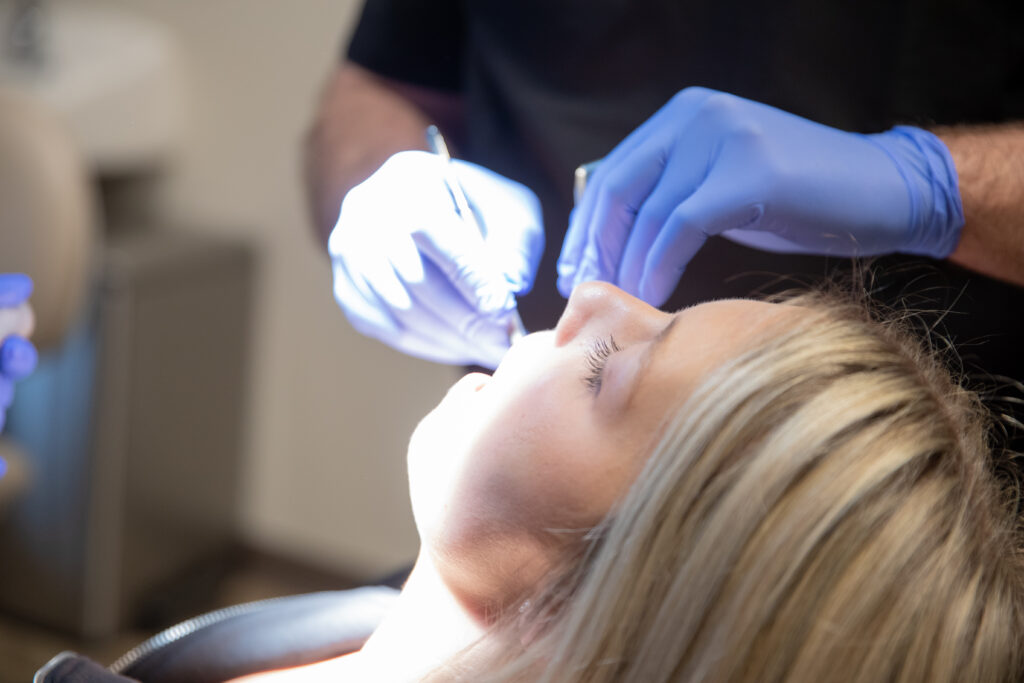
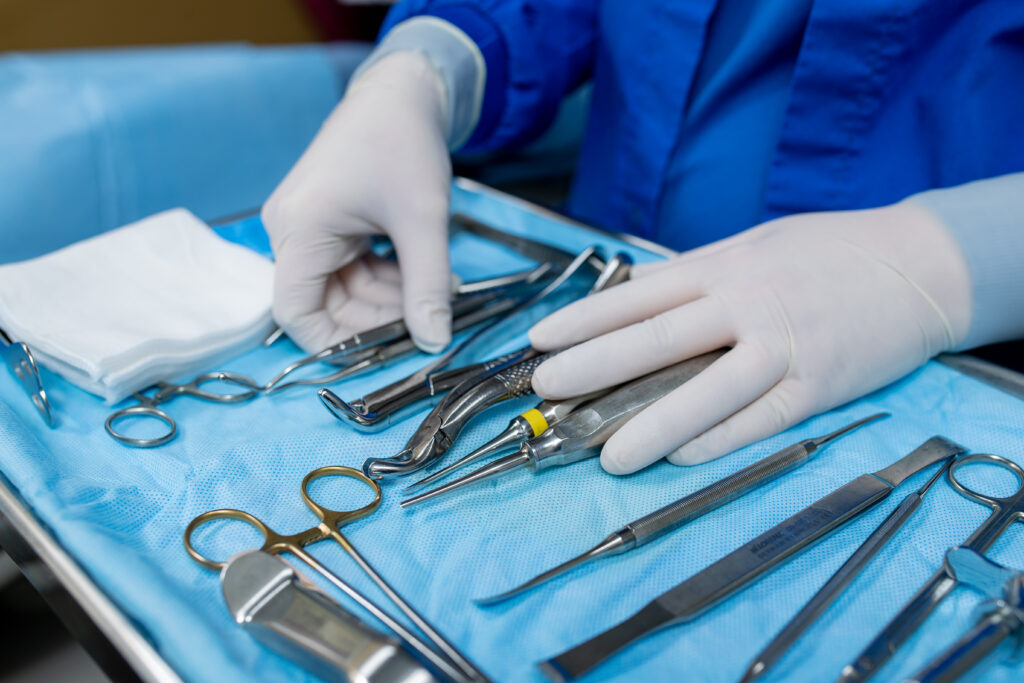
Sharp Spots
You may feel sharp areas. These are not tooth fragments, they are parts of the thin bone that surrounded your teeth. During the healing process, gum tissue will fill in over these areas. Some fragments of bone may loosen and work their way up through the gum tissue. They will often fall off with time but if they persist or are causing discomfort, call our office.
What are dry sockets?
Dry sockets continue to be the most common problem people experience following oral surgery. The pain that is experienced with a dry socket may be relieved with pain medication. A dry socket arises due to premature loss of the blood clot in the empty tooth socket. This seems to occur with greater frequency in people who smoke, use straws and/or are taking birth control pills. While both jaws can be affected, they usually occur in the lower jaw on the third to fifth day after surgery. They cause a deep, dull, continuous aching at the affected site. Patients may first notice the pain starting in the ear radiating down towards the chin. Treatment involves placing a medicated dressing in the “empty” tooth socket. The effectiveness in alleviating the pain lasts for 48-72 hours. The dressing does not aid in healing. The only reason to place a dressing is for pain control. If pain medication is controlling the pain, the socket will heal without a dressing. Most dressing must be removed after the pain is alleviated. An irrigation device may be give to you to help keep food particles from lodging in the extraction site following removal of the dressing.
Pain Control
Please use ibuprofen/Advil/Aleve (unless you are allergic to it, are taking blood thinners or are pregnant) in addition to your prescribed pain medication. Follow the package instructions unless we have advised you otherwise. This will help relieve pain and swelling and allow you to use less of the stronger medication. You may use both if necessary but many patients find they don’t need the narcotic.
If you want to avoid taking the narcotic medication you can add 2 Tylenol twice per day to the regimen above
Get to know us.
At Washington Oral & Facial Surgery, we know how to help you. Our board-certified surgeons and expert staff can provide the care you need to relieve the discomfort you feel.


